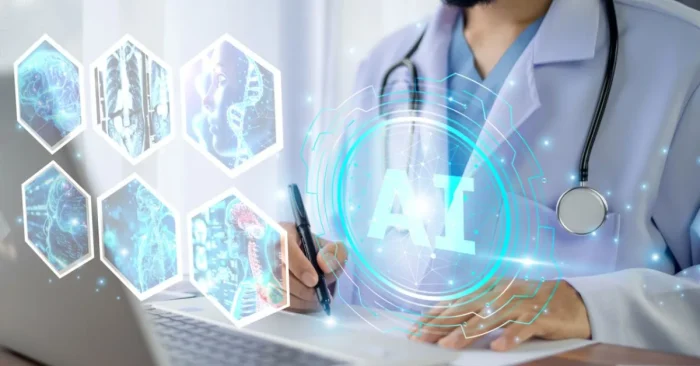Overview
AI tools for remote diagnostics are revolutionizing healthcare by enabling accurate and timely diagnosis without the need for in-person visits. These tools leverage artificial intelligence, machine learning, and advanced data analytics to analyze patient symptoms, medical imaging, lab results, and wearable device data remotely.
AI algorithms detect abnormalities, predict disease progression, and generate actionable insights for clinicians. By providing real-time analysis and telemedicine integration, these tools improve accessibility to healthcare, reduce diagnostic delays, and optimize treatment planning. Widely adopted in hospitals, clinics, and telehealth platforms, AI-powered remote diagnostics tools enhance patient care, enable early disease detection, and support cost-effective healthcare delivery while ensuring precision, efficiency, and safety in medical evaluation.
1. Babylon Health – AI Symptom Checker
Babylon Health uses AI to analyze patient-reported symptoms and medical history for remote diagnosis. AI algorithms provide recommendations for potential conditions and triage advice. Integrated with telemedicine consultations, the platform enables timely clinical evaluation, reducing the need for in-person visits and improving healthcare accessibility.
2. Buoy Health – AI Health Assistant
Buoy Health leverages AI to assess symptoms and provide preliminary diagnostic suggestions. AI algorithms analyze patient input and generate personalized guidance, helping users understand potential conditions. The platform assists clinicians by providing structured data for remote consultations and early intervention.
3. K Health – AI Telemedicine Support
K Health uses AI to analyze patient symptoms and medical history for remote consultations. AI algorithms identify patterns and suggest possible diagnoses, enabling efficient triage. Integrated with telemedicine, the platform allows clinicians to provide informed care and follow-up guidance remotely.
4. Ada Health – AI Diagnostic Tool
Ada Health leverages AI to assess symptoms and generate differential diagnoses. The platform analyzes patient-reported data and medical history, providing remote diagnostic insights. AI-powered suggestions help clinicians prioritize care, enhance accuracy, and improve patient outcomes without requiring physical visits.
5. TytoCare – AI Remote Examination
TytoCare combines AI with remote examination devices to capture heart, lung, and throat data. AI algorithms analyze physiological signals and generate diagnostic insights. Integrated with telehealth platforms, TytoCare enables accurate remote diagnostics and supports clinicians in delivering timely care to patients at home.
6. HealthTap – AI Clinical Decision Support
HealthTap uses AI to analyze patient symptoms, lab results, and medical history for remote diagnostics. AI algorithms provide preliminary assessments and assist doctors in telemedicine consultations. The platform enhances diagnostic accuracy, reduces delays, and ensures efficient remote patient care.
7. iCliniq – AI Symptom Analysis
iCliniq leverages AI to evaluate patient-reported symptoms and suggest potential conditions for remote consultations. AI algorithms analyze patterns and generate structured insights for clinicians. The platform facilitates telehealth services and improves accessibility to healthcare for patients in remote locations.
8. Sensely – AI Virtual Nurse
Sensely combines AI and virtual avatars to assist patients with symptom assessment and remote diagnostics. AI algorithms analyze input data and provide preliminary diagnostic suggestions. The platform supports telemedicine workflows, enabling efficient patient triage and monitoring from a distance.
Your.MD uses AI to provide symptom checking and health advice remotely. AI algorithms analyze patient input, medical history, and potential risk factors to generate diagnostic suggestions. The platform integrates with telehealth services to ensure timely guidance and remote care delivery.
10. Mediktor – AI Diagnostic Platform
Mediktor leverages AI to analyze patient symptoms and medical history for accurate remote diagnostics. AI algorithms predict potential conditions, recommend urgency levels, and provide clinicians with structured data. The platform improves patient triage, enhances telemedicine consultations, and supports early intervention strategies.
(FAQs)
Q1: How do AI tools assist in remote diagnostics?
AI tools analyze symptoms, medical history, imaging, and wearable data to generate diagnostic insights, enabling clinicians to evaluate patients remotely with high accuracy.
Q2: Are AI remote diagnostic tools reliable for patient care?
Yes, platforms like Babylon Health, TytoCare, and Ada Health combine AI analysis with clinician oversight to ensure safe and accurate remote diagnostics.
Q3: Can AI tools help reduce hospital visits?
Absolutely, AI-assisted remote diagnostics enable timely evaluation and triage, reducing unnecessary in-person consultations and improving access to healthcare.
Learn More About AI Course https://buhave.com/courses/learn/ai/






